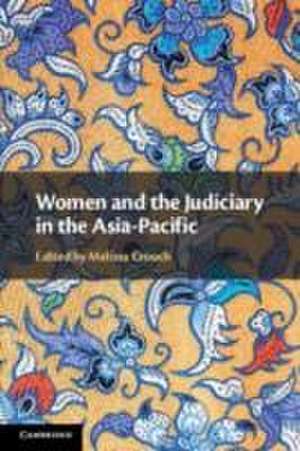Women and the Judiciary in the Asia-Pacific
Editat de Melissa Crouchen Limba Engleză Paperback – 26 oct 2023
| Toate formatele și edițiile | Preț | Express |
|---|---|---|
| Paperback (1) | 185.60 lei 3-5 săpt. | +17.45 lei 6-12 zile |
| Cambridge University Press – 26 oct 2023 | 185.60 lei 3-5 săpt. | +17.45 lei 6-12 zile |
| Hardback (1) | 728.37 lei 6-8 săpt. | |
| Cambridge University Press – 6 oct 2021 | 728.37 lei 6-8 săpt. |
Preț: 185.60 lei
Nou
Puncte Express: 278
Preț estimativ în valută:
35.53€ • 37.07$ • 29.78£
35.53€ • 37.07$ • 29.78£
Carte disponibilă
Livrare economică 20 februarie-06 martie
Livrare express 05-11 februarie pentru 27.44 lei
Preluare comenzi: 021 569.72.76
Specificații
ISBN-13: 9781108999878
ISBN-10: 1108999875
Pagini: 339
Ilustrații: Worked examples or Exercises; Worked examples or Exercises
Dimensiuni: 152 x 229 x 18 mm
Greutate: 0.45 kg
Editura: Cambridge University Press
ISBN-10: 1108999875
Pagini: 339
Ilustrații: Worked examples or Exercises; Worked examples or Exercises
Dimensiuni: 152 x 229 x 18 mm
Greutate: 0.45 kg
Editura: Cambridge University Press
Cuprins
Preface; List of abbreviations; 1. The feminisation of the judiciary in the Asia-Pacific Melissa Crouch and Natasha Naidu; 2. To join the bench and be decision-makers: Women judges in Pacific islands judiciaries Anna Dziedzic; 3. Women, adjudication and judging in Sri Lanka Dinesha Samararatne; 4. Women in the judiciary in Thailand Sarah Bishop; 5. The promise and paradox of women judges in the judiciary in Indonesia Melissa Crouch; 6. Filipino women judges and their role in advancing judicial independence in the Philippines Imelda Deinla; 7. One decade of female judges in the Malaysian Shariah judiciary: Promises to keep and miles to go Kerstin Steiner; 8. Examining women in the Nepalese judiciary through the lens of mobility Subas Dhakal, Justice Gauri Dhakal and Justice Sharada Shrestha; 9. Feminising the Indian judiciary: The gender gap and the possibilities of objectivity Simashree Bora; 10. Concluding remarks Ulrike Schultz.
Recenzii
'Moving beyond demographic description, Crouch brings together crucial scholarship on the possibilities for thick feminism when the judiciary gets substantially (and sustainably) feminized. Using accounts across sites, this volume considers the structural conditions that realize and resist women's accession to these positions of power, as well as their complicated individual narratives of success while navigating these conditions. In doing so, it forces us to (re)consider the location of the global south and its actors in legal profession scholarship.' Swethaa S. Ballakrishnen, University of California
'While attention has been paid to the growing number of women lawyers in the United States of America, Canada, Australia and the United Kingdom, and individual judges like Ruth Bader Ginsburg have captured the attention of many non-lawyers around the globe, less is known about women lawyers in the Asia Pacific. Women and the Judiciary in the Asia-Pacific is a timely collection, making a significant contribution to ensuring efforts to overcome and address issues of inequality, discrimination and gender injustice are better understood. This book enables lawyers and legislators, public policy makers and comparative scholars to benefit from the excellent contributions in this collection, and better appreciate the active citizenship of women lawyers around the globe.' Kim Rubenstein, Co-Director, 50/50 by 2030 Foundation, Faculty of Business, Government and Law, University of Canberra
'This impressive collection considers a question that continues to challenge feminist legal scholars and practitioners: what role do women in the judiciary play in achieving gender equality? Applying this to a hitherto under-examined field – courts and the legal profession in the Asia-Pacific -it explores both the 'promise and paradox' of the work of women judges. In its rich historical and contemporary accounts of multiple countries in the region, it offers a 'thick' description of what the 'feminisation of the judiciary' may mean, and in doing so will prove indispensable for scholars in the field and fascinating for general readers. Original and illuminating in both its subject matter and its perspective, it brings together a team of country specialists, under the editorship of one of the leading experts in the judicial systems of the Global South.' Helen Irving, Professor Emerita, University of Sydney
'While attention has been paid to the growing number of women lawyers in the United States of America, Canada, Australia and the United Kingdom, and individual judges like Ruth Bader Ginsburg have captured the attention of many non-lawyers around the globe, less is known about women lawyers in the Asia Pacific. Women and the Judiciary in the Asia-Pacific is a timely collection, making a significant contribution to ensuring efforts to overcome and address issues of inequality, discrimination and gender injustice are better understood. This book enables lawyers and legislators, public policy makers and comparative scholars to benefit from the excellent contributions in this collection, and better appreciate the active citizenship of women lawyers around the globe.' Kim Rubenstein, Co-Director, 50/50 by 2030 Foundation, Faculty of Business, Government and Law, University of Canberra
'This impressive collection considers a question that continues to challenge feminist legal scholars and practitioners: what role do women in the judiciary play in achieving gender equality? Applying this to a hitherto under-examined field – courts and the legal profession in the Asia-Pacific -it explores both the 'promise and paradox' of the work of women judges. In its rich historical and contemporary accounts of multiple countries in the region, it offers a 'thick' description of what the 'feminisation of the judiciary' may mean, and in doing so will prove indispensable for scholars in the field and fascinating for general readers. Original and illuminating in both its subject matter and its perspective, it brings together a team of country specialists, under the editorship of one of the leading experts in the judicial systems of the Global South.' Helen Irving, Professor Emerita, University of Sydney
